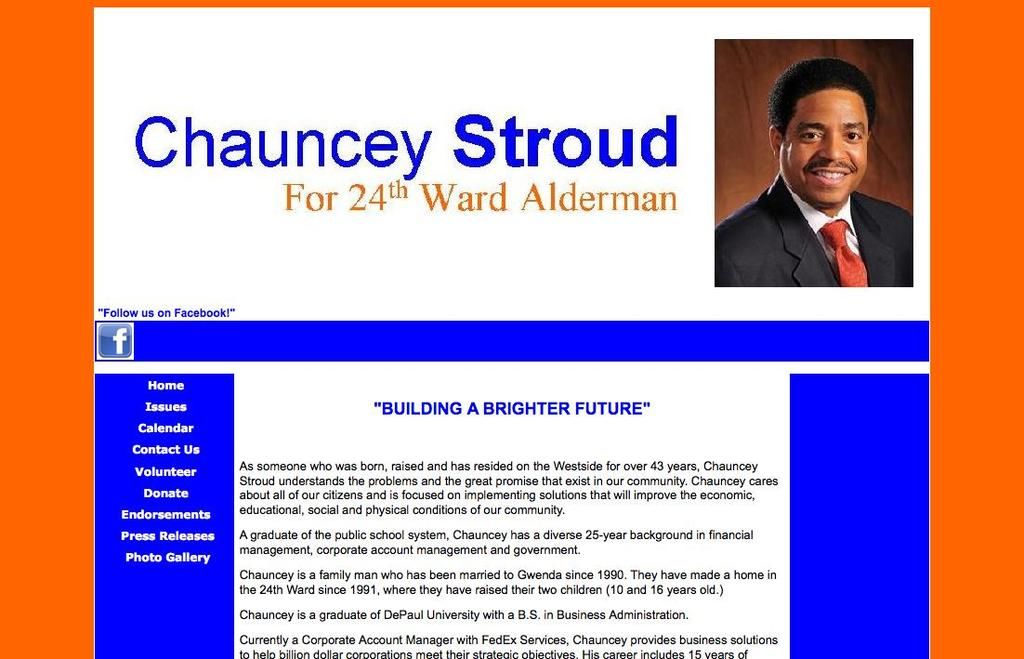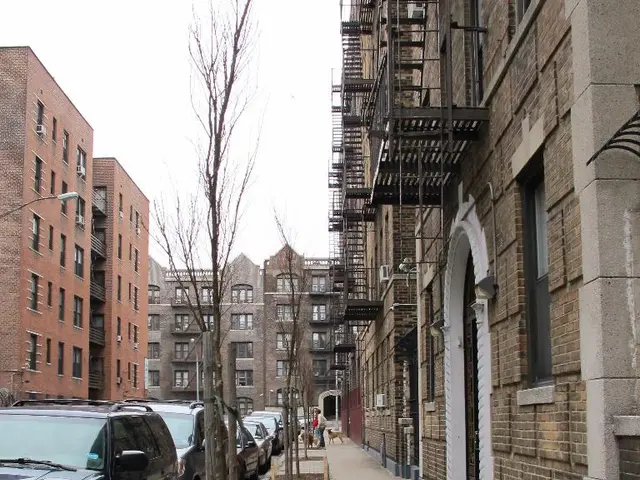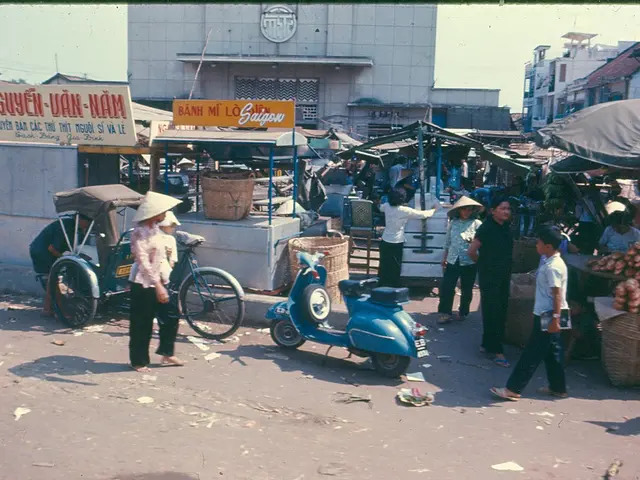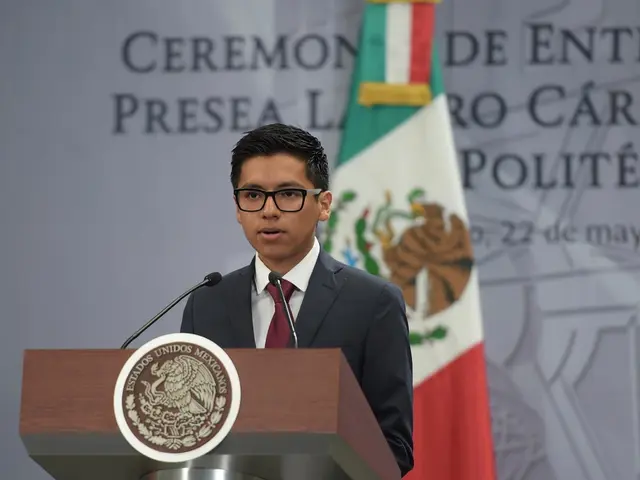Keep Informed with "Day in GL": Your Daily Local News Briefing
Young-leaning parties excel in attracting support from the youth demographic.
Welcome to our morning newsletter! We deliver the local updates straight to your inbox at 7:07 AM.
Sign Up Now! Over 166,000 young individuals under the age of 18 have cast their votes in the countrywide under-18 election. The city of Bergisch Gladbach reported some unexpected results from two polling stations set up for the youth election. We chatted with young locals at the UFO youth center about politics and their election participation, giving them a platform to share their thoughts.
Meet Feni, a 17-year-old who is crystal clear about his political preference but is disheartened by the fact that he can't exercise his voting right in national elections due to his age. With his 18th birthday just around the corner, he would have been eligible to vote in the scheduled election back in September.
Our Take
"I believe the voting age should be lowered to 16," asserts Feni. The under-18 election presents a meaningful opportunity for youth like Feni to vote, voice their opinions, and gain political representation.
The under-18 election takes place nationwide roughly two weeks prior to the adult election. In North Rhine-Westphalia, the state youth council has been organizing the youth election since 2012 to amplify these young voices and ensure they are heard.
Over a span of 8 days, close to 166,443 votes were cast nationwide in approximately 1,800 polling stations. Within North Rhine-Westphalia, over 37,000 young individuals cast their votes in over 460 polling stations.
In Bergisch Gladbach, polling stations were established at the "Jugend-Kulturzentrum Q1" in the city center and the "UFO Jugendkulturhaus der Awo" in Bensberg.
A Quick Note for Clarification:
The under-18 election has no correlation with the Junior Election, an event that takes place solely in schools across the nation this week. The results of the Junior Election will be unveiled simultaneously with the federal election results.
"It's essential for political parties to pay attention to what tomorrow's voters prioritize," says Martin Greiber, director of the "UFO." He also points out that there are young people who inform themselves and show political interest. The "UFO" has served as a polling station for under-18 and under-16 elections on multiple occasions.
Poltical Education as a Key Emphasis
Political education is a major focus at the Awo youth culture house. Greiber highlights the under-18 election as a measure that promotes democracy. "Democracy isn't simply given; we aim to convey that active participation and engagement - through voting, debating, and discussing - are crucial." Young people have the opportunity to practice voting and engage with politics at the youth center. "We support their efforts."
In the center's foyer, information stands are set up alongside the voting booths, providing information on the voting procedure, first and second votes, the ballots, parties, and their respective programs.
A poster lists the "U18 youth questions" on youth-relevant topics such as children's rights, youth policy, and child poverty, and the respective positions of the parties. In the "Populist Poker," statements like "Refugees are a burden on our economy" or "Media are controlled" are fact-checked.
Navigating the Digital Divide
With many young people primarily relying on social media for information, "This is a tactic right-wing populist parties have been using for a long time," says Martin Greiber. "They oversimplify things and rely on emotion rather than facts." Social media platforms are awash with such content that is often presented to young people unfiltered. Therefore, educational efforts are vital.
"The youth center is not primarily a political venue; young people come here to spend their free time," explains Greiber. However, the center provides an environment where they can experience models of cooperation, cultures of debate, and conflict resolution.
We caught up with several young participants of the under-18 election at the "Ufo" to let them share their opinions and thoughts on politics.
Feni, 17
"I've already voted in the European elections and I advocate for a lower voting age of 16. As long as only 18-year-olds can vote, politicians won't have much incentive to act for young people. It's important for me to participate."
While he acknowledges that he may not be as informed on complex political issues as some of his peers, Feni would know his preferred party based on discussions he's had, most recently at school with various politicians. He notes that his political stance shifted after the discussions. "I wouldn't be entirely sure about my first vote. I'd need to examine the candidates more closely." For the under-18 election, Feni based his first vote on his second choice.
"It's crucial that students and young people are informed. Only then can we collectively combat right-wing extremist forces. I'm active on social media but I don't receive much political content from it. I believe it's important to educate myself through other channels, such as ARD Tagesschau or school."
Sam, 14
"It's essential that the right doesn't get voted for. I discuss politics with my older brother at home. I took part in the under-18 election and made an informed decision by learning about the parties and their programs.
I endorse the current voting age of 18, as many of my friends lack a genuine understanding of politics and are influenced by TikTok.
I collaborated with an Ufo employee to create a poster showcasing various statements that need to be attributed either to the AfD or the NSDAP (Nazi Party). I found it disquieting how hard it is to distinguish the parties. Everyone should be aware of the past."
Sam's grandmother, who was 14 during World War II, shared her personal experiences with him, including spending time in prison due to her parents' refusal to cooperate with the Nazis. Sam felt it was important to raise awareness about the historical events and their relevance in the current political climate.
Ivo, 13
"We talked about elections and democracy in politics class. To determine which party suits me, we used a Wahl-O-Mat in class. I didn't fully comprehend all the statements, so I skipped some. The party that came up for me is the one I would support."
Policy makers could pay more attention to what matters to young people, such as playgrounds and leisure activities, Ivo suggests. He discussed politics with his parents, particularly regarding the Ukraine conflict, because they have relatives in Kazakhstan.
Ivo wonders why right-wing parties are growing in popularity again. Classmates of his make light of the events from the Third Reich, he mentions. He thinks it's important for more historical events to be taught at school, as many people may not be aware of them.
"Many promises are made during election campaigns, but not all parties live up to their promises. It's important to separate the truth from lies and facts from opinions."
- In the daily local news briefing, the under-18 election serves as a platform for young individuals to exercise their voting rights, voice their opinions, and gain political representation, providing them with valuable experience in democracy and self-development.
- To combat the influence of right-wing populist parties using social media platforms, political education is essential in providing young people with the factual information they need to make informed decisions and avoid being swayed by oversimplified and emotional content.







